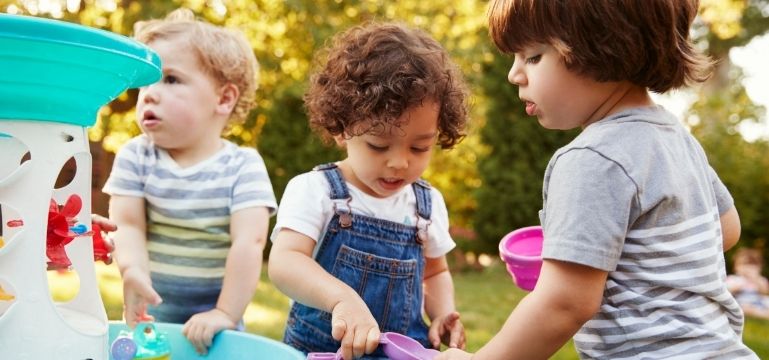Using the outdoors to develop pupils’ imagination and role play.

Quick links:
Information about the setting
Corwen Day Nursery is a small bilingual nursery in rural North Wales. It delivers high quality care in an environment that allows children to be curious and confident in their play. It inspires children to investigate and make discoveries in its happy, safe, nurturing, and healthy setting. Practitioners look after about 58 children in total, and an average of 30 each day aged between 6 months and 4 years. The setting provides Early Education to a handful of children for two terms, and delivers regular forest school sessions at the local woods and nearby river. It brings curiosity into the children’s lives by providing opportunities for them to play with natural resources. It sets up daily invitations to learn and ‘provocations’ designed to excite and stimulate children’s curiosity to learn about the world about them. Practitioners engage in a range of professional learning opportunities, which help to develop their approach.
Context and background to the effective or innovative practice
Practitioners firmly believe that outdoor play offers new and exciting learning opportunities for children. Many are able to manage their behaviour and emotions far better outdoors as their immune system is also being boosted by being in the fresh air. Practitioners encourage the children to challenge themselves and experience the world around them. They allow the children to get muddy, and take appropriate risks as they climb, develop creativity and build with a range of resources. Being outdoors allows the children to move more freely. They develop an awareness of controlling risks and a better sense of spatial awareness as well as increased self-confidence, independence and self-esteem. The children have well-developed gross motor skills due to opportunities to create their own assault courses where they need to climb and maintain their balance. They love spending lengthy periods playing on the balance bikes and trikes.
Description of nature of strategy or activity
Practitioners began investing in the outdoor areas in 2015 when a colleague from a support organisation advised how they could develop them. She felt that the setting had a great outdoor space but that practitioners weren’t making the most effective use of it.
The three play rooms now have direct access to their own outdoor areas, and children spend more time outdoors than indoors. In 2018 the setting bought a small parcel of land next to the nursery because none of the outdoor areas had grass and practitioners wanted to provide a totally different experience for the children. All children have all in ones and wellies and these are washed daily. By having the appropriate clothing, the setting is able to embrace the outdoors in all weathers. Staff are aware that most of their day will be spent outdoors so they know to dress appropriately.
What impact has this work had on provision and children’s standards?
Children are given the opportunity to create their own assault courses on the field and large plastic pipes are used as slides. A real canoe allows the children to use their imagination and there is a mud kitchen, and a homemade tee pee, which is highly effective in stimulating role play. There are plenty of opportunities for digging in the mud and playing with bark and different stones. To access this particular area the children have to climb up over obstacles that they have to put in a position to allow them to climb safely. The climbing frame is also popular, as is the tuff tray pouring activity.
How have you shared your good practice?
Practitioners educate new staff and parents on why outdoor play is so important and the outdoor play provision offers all children the opportunity to freely interact with or experience the following:
- Other children
- The natural world – mud, water, bugs, worms
- Loose parts – sticks, stones, cardboard boxes, crates, cable reels etc.
- The elements
- Challenge and uncertainty
- Movement
- Rough and tumble
- The senses, listening to the birds and tasting the rain